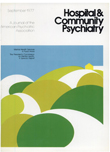A Follow-up Study of Disturbed Children Treated in a Re-ED Program
Abstract
In 1974 the authors undertook an evaluation of the children's program at Marshall I. Pickens Hospital in Greenville, South Carolina. The program, based on the Re-ED model, accepts only boys of normal intelligence between the ages of six and 12; most are referred because of disruptive behavior in the classroom and at home and low academic achievement. To evaluate the program, questionnaires were mailed to the families of all children who had been dischargedfrom the program six months or longer, a total of 123. Sixty-three of the 101 parents responding said the program had provided very much help for their child. At follow-up 89 children were enrolled in some kind of school program, and one had graduated from high school. However, 66 parents reported their child continued to have academic problems. The authors compare the findings with follow-up studies of three other Re-ED programs and discuss possible modifications that might make such programs more effective for children who fail to adjust.
Access content
To read the fulltext, please use one of the options below to sign in or purchase access.- Personal login
- Institutional Login
- Sign in via OpenAthens
- Register for access
-
Please login/register if you wish to pair your device and check access availability.
Not a subscriber?
PsychiatryOnline subscription options offer access to the DSM-5 library, books, journals, CME, and patient resources. This all-in-one virtual library provides psychiatrists and mental health professionals with key resources for diagnosis, treatment, research, and professional development.
Need more help? PsychiatryOnline Customer Service may be reached by emailing [email protected] or by calling 800-368-5777 (in the U.S.) or 703-907-7322 (outside the U.S.).



